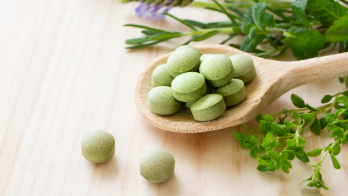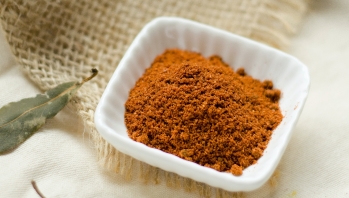Turmeric 101: what science has to say about health benefits, supplementation, and more
Turmeric is an ancient spice that boasts many health benefits, as research indicates it can lower inflammation, improve brain health, and reduce oxidative stress. Here’s what you need to know about turmeric, and if a supplement may be worthwhile.
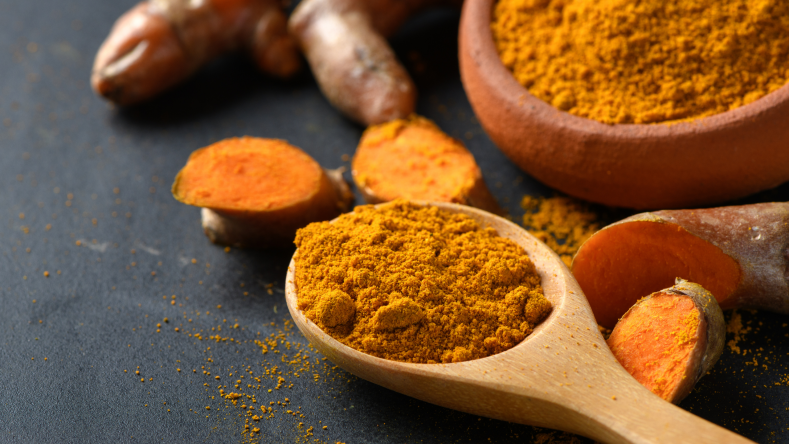
Contents
What is turmeric? How much turmeric should you take each day? What should you look for in a turmeric supplement? Benefits of turmeric How long does it take for turmeric to work? How much turmeric is too much? Who should not take turmeric supplements? What medications should not be taken with turmeric? Summary Key takeawaysIf you’re looking for ways to reduce inflammation, ease joint pain, and possibly boost your mood, turmeric may be worth trying. From dosing and supplements to health benefits and safety precautions, here’s everything you need to know about turmeric.
What is turmeric?
Turmeric is a bright yellow spice made from the root of the Curcuma longa plant that is native to Southeast Asia. A relative of ginger, turmeric’s root stalk has been used for culinary and medicinal purposes for thousands of years. Typically, the dried root stalk is ground into a spice or taken as a powder in capsule form.
Turmeric is the primary ingredient in curry powder (as it adds a brilliant yellow hue and a warm, bitter taste), but it’s also added for color and flavor to mustards, butter, and cheeses.
What is the difference between turmeric and curcumin?
The difference between turmeric and curcumin is that curcumin is a naturally occurring compound that gives turmeric its bright yellow color and potent anti-inflammatory properties. Evidence suggests curcumin can alleviate pain and inflammation, as well as symptoms of arthritis, depression, inflammatory digestive disorders, and more [ 1
The curcumin and the curcuminoids in turmeric supplements have been extracted to produce much more potent supplements than the ground turmeric used in cooking. If you look at the label of a turmeric supplement, you’ll notice it contains a percentage of curcumin/curcuminoids (typically around 95%), whereas pure curcumin extract contains 100% curcumin.
While many of the health benefits of turmeric are linked to its curcumin content, some studies suggest turmeric has its own benefits —possibly ones that curcumin alone doesn't— but more research on this topic is needed [ 1
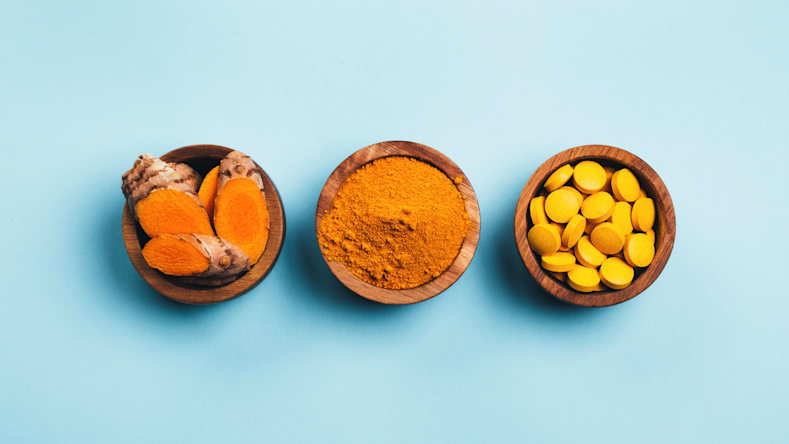
How much turmeric should you take each day?
There is no standard dose for turmeric; however, the World Health Organization (WHO) has established 1.4 mg of curcumin/pound of body weight (0–3 mg/kg) as an acceptable daily intake [ 5
Turmeric supplements are available in different dosages and contain varying amounts of curcumin. For instance, studies have shown that supplements that provide 500-1,500 mg of curcumin/day have been associated with numerous health benefits related to inflammation, arthritis, depression, and intestinal bowel disease [ 1 19
For minimizing exercise-related muscle soreness, taking 400-2,000 mg curcumin/day in the days leading up to and following exercise seems to be most beneficial [ 8
If you’re confused about how much turmeric you should take, there’s no need to worry. At Elo Health, we take the guesswork out of the equation by overlaying your blood biomarker results, wearable data, and questionnaire answers to recommend the right nutrition and supplements for you. Your personalized daily smart supplement pack contains custom-dosed nutrients selected for your biomarkers, health data, and goals, based on the latest available science. Moreover, Elo’s formulary includes over 60 nutrients (including turmeric), all of which undergo rigorous third-party testing.
What time of the day should you take turmeric?
The best time of the day to take turmeric is just before or immediately after a meal. This is because curcumin is fat-soluble, and pairing it with dietary fat will increase its absorption.
What should you look for in a turmeric supplement?
Turmeric supplements should contain a high concentration of curcumin, as well as piperine (an ingredient to enhance absorption). Let’s examine these in a bit more detail.
Curcumin. Because many of the benefits of turmeric come from this compound, a turmeric supplement should include a high concentration of curcumin. However, curcumin is poorly absorbed, so a turmeric supplement should also contain an ingredient (like piperine)to help enhance curcumin absorption by the body.
Piperine. This is a compound found in black pepper, and is commonly added to turmeric supplements as research shows taking curcumin with piperine can help the body absorb up to 2,000% more curcumin [
20
].
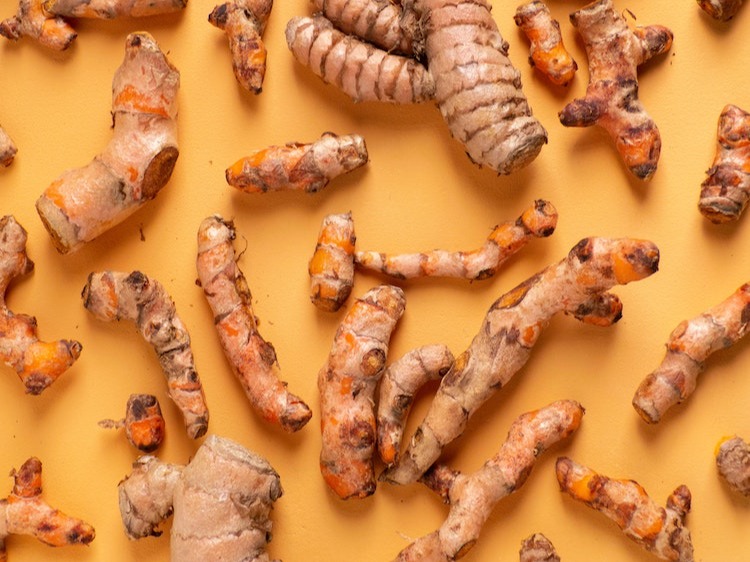
Benefits of turmeric
Turmeric has many science-backed health benefits, as it has the potential to lower markers of inflammation and oxidative stress, and improve symptoms of depression, arthritis, and inflammatory bowel disorders. Moreover, early evidence suggests it may even help seasonal allergy sufferers as well as prevent Alzheimer's and certain cancers. Here’s what science has to say about the benefits of turmeric.
Lower levels of inflammation and oxidative stress.
Incorporating turmeric in your diet, either with foods or as a supplement, may be beneficial for reducing chronic inflammation and oxidative damage that can contribute to aging and other inflammatory chronic diseases [ 3 4
Experts have long established that the curcumin in turmeric possesses potent anti-inflammatory and antioxidant properties, both of which can reduce total body inflammation and oxidative damage to cells, proteins, and DNA [ 2 3 1
Reduced joint pain.
Numerous studies have shown that the compounds in turmeric (including curcumin) can reduce inflammation and relieve symptoms of certain types of arthritis [ 1 6
One meta-analysis found that supplementation of 1,000 mg of curcumin/day can be beneficial for reducing pain and improving physical function in individuals with osteoarthritis [ 6 7
Given these findings, it’s suggested that taking 500-1,000 mg of curcumin/day for 8-12 weeks may be the most effective option for relieving osteoarthritis pain and inflammation, as it could be better tolerated than ibuprofen [ 8
While the preliminary research is promising, more high-quality studies would be beneficial in determining turmeric’s long-term safety, efficacy, and dosing recommendations for the treatment of arthritis [ 1
Improved symptoms of depression and anxiety.
Several studies have shown curcumin’s unique anti-inflammatory and neuro-modulating effects may be able to exert antidepressant benefits in those with depression.
One meta-analysis found that curcumin in turmeric produced small but significant reductions in depressive symptoms in patients with major depression, particularly in middle-aged populations and those given turmeric for longer periods and at higher doses [ 9
Another small trial found taking 1,000 mg/day of curcumin produced benefits comparable to Prozac, a common prescription antidepressant medication [ 10 10
Studies have also found curcumin to be somewhat effective in reducing anxiety symptoms [ 11
Given these findings, turmeric supplementation that provides 500-1,000 mg/day of curcumin may help improve symptoms of depression and anxiety [ 11
Reduced symptoms in inflammatory bowel disease.
Given turmeric’s potent antioxidant and anti-inflammatory properties, and its ability to alter the gut microbiome, turmeric supplementation may be beneficial for those with digestive disorders including irritable bowel syndrome (IBS) and ulcerative colitis (UC) and Crohn’s disease [ 1 12
Irritable bowel syndrome: Studies have found that those with IBS who took a standardized turmeric supplement (with curcumin) reported improvement in symptoms, pain, and discomfort compared to those who didn’t take curcumin [
12
,13
].Ulcerative colitis: Turmeric (curcumin) may also be beneficial for those with UC. Research shows that people who took 2 g of curcumin/day and their regular prescription medication were more likely to stay in remission than those who took prescription medication alone [
14
].Inflammatory bowel disease: Turmeric supplementation has been found to significantly reduce clinical relapse of inflammatory bowel disease (IBD) in patients taking 360 mg of curcumin 3-4 times daily for three months [
15
].Crohn’s disease: Studies indicate that curcumin reduced symptoms associated with both Crohn's disease and UC [
16
].
Given that turmeric is generally safe and well-tolerated, doses providing 1,000-2,000 mg of curcumin/day for up to 12 weeks may benefit those with inflammatory bowel conditions, particularly IBS, UC, and Crohn’s disease. However, more randomized, controlled clinical studies with large patient populations are needed to fully evaluate the clinical potential of curcumin in the treatment of these conditions.
Potential benefits for brain health, inflammatory diseases, and cancer.
Studies suggest that turmeric has potential benefits for the brain and other inflammatory-related conditions, including diabetes, metabolic syndrome, cardiovascular disease, Alzheimer’s, and allergic rhinitis [ 1 17
Researchers are also interested in turmeric’s anti-cancer properties, as some studies show that curcumin in turmeric might work against lung, breast, prostate, and colon cancers [ 18
The curcumin in turmeric also has potent antimicrobial properties that may be beneficial for suppressing the replication of certain viruses and modulating the body’s inflammatory response to COVID-19 [ 1
While the potential benefits are great, the research on these topics remains limited and less consistent, so more high-quality studies are needed to determine turmeric’s effects in these areas.
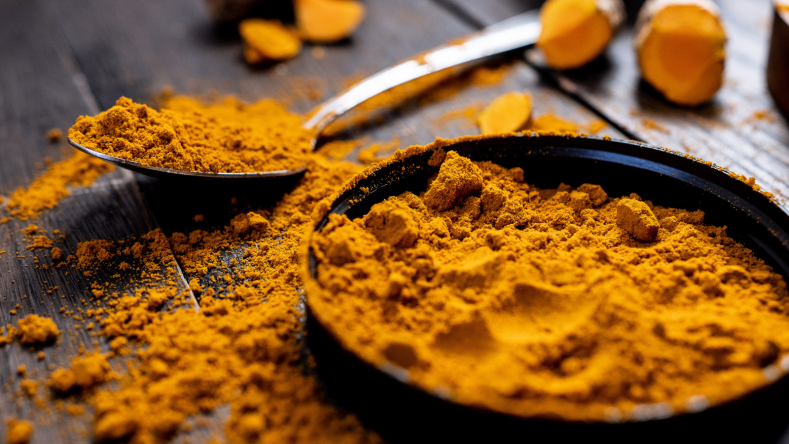
How long does it take for turmeric to work?
Research suggests it can take anywhere from one hour to several weeks for turmeric and the effects of curcumin to work, depending on the dose and benefit you’re seeking.
To reduce inflammation: Most studies report improvements for chronic inflammation and symptoms of inflammatory disease after 8-12 weeks of daily supplementation [
8
].To reduce symptoms of depression: Improvements have been noted after 6-12 weeks of turmeric supplementation [
10
,11
].To improve mood: Improved fatigue, calmness, and contentedness have been noted after 4 weeks of daily supplementation [
8
].To improve sustained attention and memory tasks: Curcumin in turmeric supplements may show benefits in as little as one hour [
8
].
How much turmeric is too much?
Taking high doses of turmeric and curcumin long-term is not recommended due to a lack of research on their safety. Research shows that turmeric products that provide up to 8 g of curcumin/day seem safe for up to 2 months [ 19
While turmeric typically doesn't have serious side effects, when taken at higher doses, mild side effects (like stomach upset, nausea, dizziness, or diarrhea) may be more common [ 19
Who should not take turmeric supplements?
Pregnant women should not take turmeric supplements, and given the lack of evidence about its safety, children and women who are breastfeeding should not take turmeric unless recommended by a doctor [ 19
Individuals with diabetes, gallstones, gallbladder or kidney disease, bleeding disorders, or immunity problems should consult their doctor prior to using turmeric supplements since they may worsen these conditions [ 19
Because turmeric can potentially increase bleeding, you should stop taking it at least two weeks before any surgery [ 19
What medications should not be taken with turmeric?
Turmeric can interact with numerous medications. Avoid turmeric supplements or consult with your physician before supplementing with turmeric if you take any of the following medications [ 19
Anticoagulant or antiplatelet drugs
Medications for diabetes
Talinolol
Sulfasalazine (Azulfidine)
Tacrolimus (Prograf) or Warfarin (Coumadin)
Cancer medications
Amlodipine (Norvasc)
Tamoxifen
Medicines that can harm the liver
Medications changed by the liver
Norfloxacin (Noroxin)
Docetaxel (Taxotere)
Estrogen
Summary
Turmeric is a popular spice that is frequently used in cooking to flavor or color foods. It contains curcumin, a bioactive compound associated with numerous health benefits (like reducing general pain and inflammation, and improving symptoms of depression, arthritis, and inflammatory bowel disease). It is also taken for exercise recovery, hay fever, high cholesterol, and high blood pressure and to improve memory, attention, and mood.
The best sources of turmeric are foods that contain the spice and turmeric supplements. While turmeric supplements are available in different dosages and contain varying amounts of curcumin, they should have a high percentage of curcumin/curcuminoids and an ingredient–like piperine–to increase the absorption of curcumin.
There is no standard dose for turmeric; however, it has most often been used by adults in amounts of up to 1,500 mg daily for up to 9 months [ 19
Disclaimer: The text, images, videos, and other media on this page are provided for informational purposes only and are not intended to treat, diagnose or replace personalized medical care.
Key takeaways
Turmeric is a popular spice that contains curcumin, a bioactive compound associated with numerous health benefits. There is solid evidence to support its use for reducing general pain and inflammation and easing symptoms of depression, arthritis, and inflammatory bowel disease [
1
].Turmeric supplements are available in different dosages and contain varying amounts of curcumin. However, they should have a high percentage of curcumin/curcuminoids and an ingredient–like piperine–to increase the absorption of curcumin.
Turmeric supplements are most often used by adults in doses of up to 1,500 mg/day for up to 9 months [
19
].Those who are pregnant, breastfeeding, or have diabetes, gallstones, kidney disease, bleeding disorders, or immunity problems should consult their doctor prior to using turmeric supplements since they may worsen these conditions [
19
].
References:
Patel, K. (2022a, March 18). Curcumin. Examine.Com. Retrieved April 28, 2022, from
https://examine.com/supplements/curcumin/
Pahwa R, Goyal A, Jialal I. Chronic Inflammation. [Updated 2021 Sep 28]. In: StatPearls [Internet]. Treasure Island (FL): StatPearls Publishing; 2022 Jan-. Available from:
https://www.ncbi.nlm.nih.gov/books/NBK493173/
Menon, V. P., & Sudheer, A. R. (2007). Antioxidant and anti-inflammatory properties of curcumin. Advances in experimental medicine and biology, 595, 105–125.
https://doi.org/10.1007/978-0-387-46401-5_
Paultre, K., Cade, W., Hernandez, D., Reynolds, J., Greif, D., & Best, T. M. (2021). Therapeutic effects of turmeric or curcumin extract on pain and function for individuals with knee osteoarthritis: a systematic review. BMJ open sport & exercise medicine, 7(1), e000935.
https://doi.org/10.1136/bmjsem-2020-000935
Amalraj, A., Pius, A., Gopi, S., & Gopi, S. (2016). Biological activities of curcuminoids, other biomolecules from turmeric and their derivatives - A review. Journal of traditional and complementary medicine, 7(2), 205–233.
https://doi.org/10.1016/j.jtcme.2016.05.005
Daily, J. W., Yang, M., & Park, S. (2016). Efficacy of Turmeric Extracts and Curcumin for Alleviating the Symptoms of Joint Arthritis: A Systematic Review and Meta-Analysis of Randomized Clinical Trials. Journal of medicinal food, 19(8), 717–729.
https://doi.org/10.1089/jmf.2016.3705
Chandran, B., & Goel, A. (2012). A randomized, pilot study to assess the efficacy and safety of curcumin in patients with active rheumatoid arthritis. Phytotherapy research : PTR, 26(11), 1719–1725.
https://doi.org/10.1002/ptr.4639
Hewlings, S. J., & Kalman, D. S. (2017). Curcumin: A Review of Its Effects on Human Health. Foods (Basel, Switzerland), 6(10), 92.
https://doi.org/10.3390/foods6100092
Al-Karawi, D., Al Mamoori, D. A., & Tayyar, Y. (2016). The Role of Curcumin Administration in Patients with Major Depressive Disorder: Mini Meta-Analysis of Clinical Trials. Phytotherapy research : PTR, 30(2), 175–183.
https://doi.org/10.1002/ptr.5524
Sanmukhani, J., Satodia, V., Trivedi, J., Patel, T., Tiwari, D., Panchal, B., Goel, A., & Tripathi, C. B. (2014). Efficacy and safety of curcumin in major depressive disorder: a randomized controlled trial. Phytotherapy research : PTR, 28(4), 579–585.
https://doi.org/10.1002/ptr.5025
Exploring curcumin for depression and anxiety. (2017, April). Examine.Com. Retrieved May 10, 2022, from
https://examine.com/members/deep-dives/article/exploring-curcumin-for-depression-and-anxiety/
Bundy, R., Walker, A. F., Middleton, R. W., & Booth, J. (2004). Turmeric extract may improve irritable bowel syndrome symptomology in otherwise healthy adults: a pilot study. Journal of alternative and complementary medicine (New York, N.Y.), 10(6), 1015–1018.
https://doi.org/10.1089/acm.2004.10.1015
Ng, Q. X., Soh, A., Loke, W., Venkatanarayanan, N., Lim, D. Y., & Yeo, W. S. (2018). A Meta-Analysis of the Clinical Use of Curcumin for Irritable Bowel Syndrome (IBS). Journal of clinical medicine, 7(10), 298.
https://doi.org/10.3390/jcm7100298
Hanai, H., Iida, T., Takeuchi, K., Watanabe, F., Maruyama, Y., Andoh, A., Tsujikawa, T., Fujiyama, Y., Mitsuyama, K., Sata, M., Yamada, M., Iwaoka, Y., Kanke, K., Hiraishi, H., Hirayama, K., Arai, H., Yoshii, S., Uchijima, M., Nagata, T., & Koide, Y. (2006). Curcumin maintenance therapy for ulcerative colitis: randomized, multicenter, double-blind, placebo-controlled trial. Clinical gastroenterology and hepatology : the official clinical practice journal of the American Gastroenterological Association, 4(12), 1502–1506.
https://doi.org/10.1016/j.cgh.2006.08.008
Hanai, H., & Sugimoto, K. (2009). Curcumin has bright prospects for the treatment of inflammatory bowel disease. Current pharmaceutical design, 15(18), 2087–2094.
https://doi.org/10.2174/138161209788489177
Holt, P. R., Katz, S., & Kirshoff, R. (2005). Curcumin therapy in inflammatory bowel disease: a pilot study. Digestive diseases and sciences, 50(11), 2191–2193.
https://doi.org/10.1007/s10620-005-3032-8
Curcumin for a clear nose. (2016, December). Study Deep Dives. Retrieved May 10, 2022, from
https://examine.com/members/deep-dives/article/curcumin-for-a-clear-nose/
Can Turmeric Fight Cancer? (2020, June 22). WebMD. Retrieved May 10, 2022, from
https://www.webmd.com/cancer/can-turmeric-fight-cancer#:%7E:text=help%20with%20cancer%3F-,Turmeric%20and%20Cancer,might%20help%20chemotherapy%20work%20better
TURMERIC: Overview, Uses, Side Effects, Precautions, Interactions, Dosing and Reviews. (n.d.). WebMD. Retrieved May 10, 2022, from
https://www.webmd.com/vitamins/ai/ingredientmono-662/turmeric
Prasad, S., Tyagi, A. K., & Aggarwal, B. B. (2014). Recent developments in delivery, bioavailability, absorption and metabolism of curcumin: the golden pigment from golden spice. Cancer research and treatment, 46(1), 2–18.
https://doi.org/10.4143/crt.2014.46.1.2





